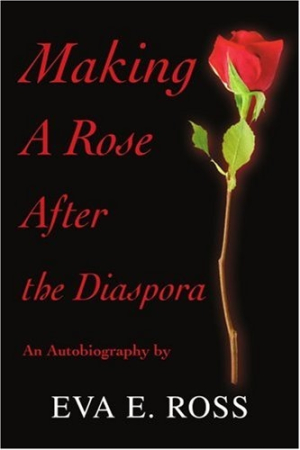Making a Rose after the Diaspora
Making a Rose after the Diaspora is an engaging autobiography that offers a first-hand account of how one Jewish woman’s life was shaped by her childhood experience escaping the Nazi Holocaust in her native Austria. At the tender age of nine, Eva Madarasz, an only child, understood that her world had changed forever when her father was taken away by Nazi sympathizers who also vandalized her home. Her father was later released, and her parents immediately focused their efforts on leaving Austria.
With a limited number of options available to them, the Madarasz family decided to follow some relatives and friends who had made their way to Uruguay. It wasn’t long, however, before the author’s father fell ill and died. Even worse, the bank that held the family’s modest savings went bankrupt. Still, her mother was able to find work, eventually running a boutique and becoming a Uruguayan citizen.
Ross divides the book into chronological sections based on where she lived, including Mexico and the United States. This is a logical structure that anchors the contents of the book. She wedded an American, but her husband, Jay, died, and she later remarried. Her second husband, John Ross, was also forced to emigrate from Austria because he was Jewish. At their wedding, a rabbi told the story of a diamond cutter who took a cracked diamond and carved it into a beautiful rose. “You both have cracks,” the rabbi said to Eva and John, “now it is time to make a rose!” Hence the book’s title, which is nicely enhanced with a photo of a rose on the cover.
Ross’s own career as a diplomat and her husband’s work as a science professor afforded them the opportunity to travel extensively. She also had the honor of accompanying her husband to Washington, D.C., where he received the National Medal of Science from President Bill Clinton.
Ross writes eloquently and intimately about her relationships, her successes and failures, and her trials and tribulations. In describing her life with her first husband, for example, the author shares details about his financial problems, his difficulties trying to start a business, and the health issues that eventually led to his death. With honesty and emotion, Ross offers her insight and perspective on life. When discussing her childhood encounters with Nazis, she states that remembering the Holocaust is the only way to prevent it from happening again. “As individuals and as a nation,” she writes, “we must commit ourselves to ending those conditions that lead to the growth of evil and hate.”
Despite the tragedy in her life, and the chronic insomnia that resulted from the terror of her childhood in Austria, Ross manages to look forward with a sense of optimism. About herself and her husband she writes that, “considering the fact that we had both started as refugees and were part of the Jewish Diaspora, we had much to be grateful for.” Eva Ross is a true survivor, and her compelling story is well worth reading.
Reviewed by
Barry Silverstein
Disclosure: This article is not an endorsement, but a review. The publisher of this book provided free copies of the book and paid a small fee to have their book reviewed by a professional reviewer. Foreword Reviews and Clarion Reviews make no guarantee that the publisher will receive a positive review. Foreword Magazine, Inc. is disclosing this in accordance with the Federal Trade Commission’s 16 CFR, Part 255.

